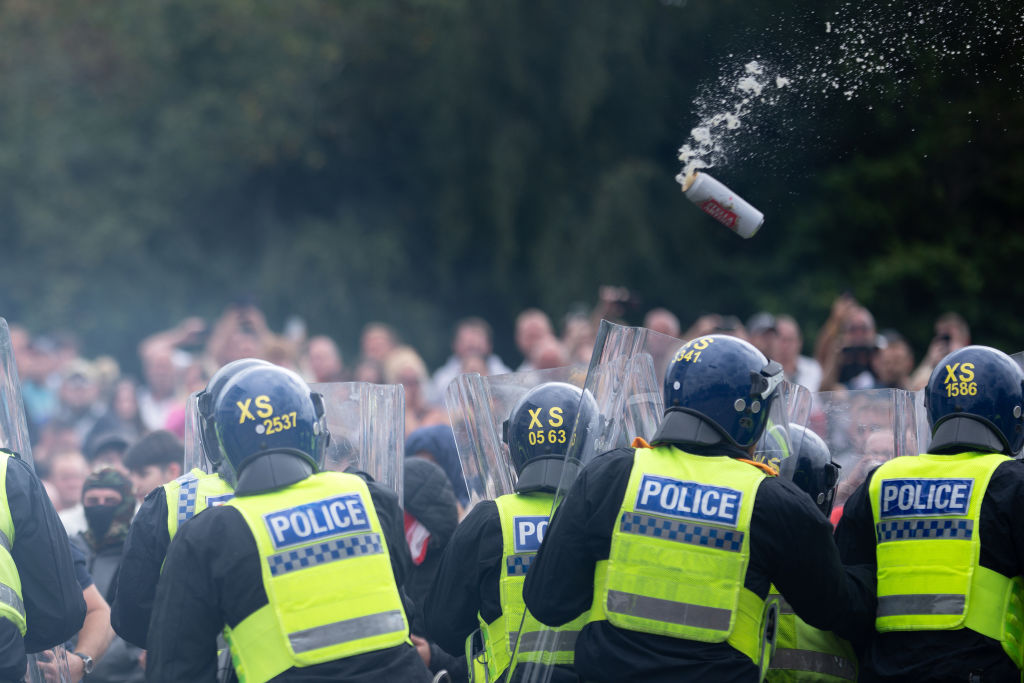Authorities encountering the kind of civil disorder that has marked the last few days in Britain are best advised to keep a cool head and quietly deploy the powers of the ordinary law to face it down. Unfortunately there are worrying signs that this is not happening. The announcement from the Director of Public Prosecutions Stephen Parkinson that the Crown Prosecution Service favours on occasion invoking terrorism laws against those co-ordinating the unrest, is a case in point.
True, in doing this the CPS would be strictly within its rights. In law, any action designed to influence the government and involving violence or serious damage to property with intent to advance a political cause is regarded as terrorism. This this clearly would cover any of the recent protests which have turned violent. But using terrorism laws would amount to a cure worse than the disease.
We have to remember that, unlike ordinary offences, state powers in cases of terrorism are drastic
For one thing, it would give those involved an over-extended idea of their own importance. Whatever the strict law may be, the disorder we have seen is not the ordinary person’s idea of terrorism, which revolves around an attack on the state, or a suggestion that violence will continue until the political demands of a particular group are met. The hoodlums who have been terrorising English cities in the last week are frightening, but they come nowhere near this. They deserve to be treated and punished as mindless thugs, no more and no less.
Secondly, the CPS’s scheme could well backfire. Juries have their own ideas of what charges are appropriate. Asked to convict a defendant of complicity in riot, violent disorder, criminal damage or something similar, they will (we hope) have sufficient common sense, if convinced that the police have the right man, to do just that. And if they do so, the penalties are more than adequate. Criminal damage carries ten years, or life if done with recklessness as to whether life is endangered (for example, setting fire to a migrant hostel); riot ten years; violent disorder five; affray, three. However, if requested to convict that same defendant of an act contrary to the terrorism legislation, then even if the requirements of the law are srictly speaking satisfied they may well object and decline to do so.
Thirdly, we have to remember that, unlike ordinary offences, state powers in cases of terrorism are drastic: they include stop and search, compulsory evacuation of homes, a duty to inform the authorities of information relating to terrorism, extended police powers of detention of suspects, and a whole host of others. This is no doubt acceptable to the public, but only with a quid pro quo: these are exceptional remedies, and should be used only for exceptional situations. If any attempt is made to use them simply to set an example to those involved in public disorder, albeit serious, the result is liable to be a further loss of confidence in the police and other authorities.
Most importantly, however, invoking anti-terrorism powers will inevitably amplify complaints that this crisis is not being dealt with honestly and even-handedly. The government has not made a good start. We have repeated allegations of two-tier policing, which are beginning to stick: critics claim that there is one law for ordinary people exemplified by the white working class, who are faced with the full force of the law, another for particular interest groups or classes of protesters whom the police are frightened to engage with directly, and whose activities are to a greater or lesser extent condoned. Robert Jenrick, the Tory leadership hopeful, said yesterday that police officers should not be ‘squeamish or selective’ in the way they do their jobs.
The use of exceptional anti-terrorism powers against those involved on the far-right side is likely to make this worse. Suppose those behind, say, intimidatory demonstrations outside migrant hostels are proceeded against in this way. This will immediately provoke comparisons not only with the counter-protesters from this round of disorder, but also with, say, Just Stop Oil militants damaging buildings or works of art, or Palestinian protesters intimidating Jews going about their ordinary business. These groups have as much of the terrorist about them as a bunch of tanked-up thugs on a spree of mayhem and looting over a vaguely-formulated grievance about immigration and the neglect of their communities. Nevertheless, few would disagree that regarding them as terrorists would be taking to the cracking of a nut not so much a sledgehammer as a nuclear bomb. If so, how can we justify treating domestic hell-raisers any differently?






Comments